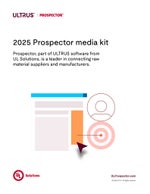Promote your products and generate leads
The Prospector® Material Discovery platform is the search engine trusted by thousands of verified product developers looking to connect with material suppliers. This exclusive audience of Prospector members is qualified, validated regularly and highly engaged.
Make the most of a wide array of marketing tools to generate the awareness, leads and sales you need to propel your business success. As part of ULTRUS™ software from UL Solutions, Prospector allows you to connect with your target audience to make it all happen.
Get listed
Make sure your products are visible all day, every day on ULProspector.com
Generate leads
Receive verified and complete contact information when industry professionals view your products
Increase brand awareness
Drive traffic to your products with highly targeted digital media options

Measure results
Receive actionable insights to allow you to refine and optimize results
Sales intelligence and lead generation
Identify prospects and make informed business decisions with our lead generation and analytics. When industry professionals view your materials or technical documents on Prospector, we’ll let you know — in real time. You receive verified business information including name, company, email, phone number and more. You can even seamlessly integrate this insight and activity into your CRM system.
Targeted digital media
Maximize your advertising strategy with media options that align with your marketing goals. Increase your reach while still being focused on a targeted audience by accessing our large member base of industry professionals. We allow you to segment your audience and advertise by region, industry, job title, business type and more. Download the media kit to learn more.
Webinar packages
Newsletter advertising
On-site advertising
Targeted emails

2025 Prospector Media Kit_10.4.24_EN
Case study
CHT USA generates sales-ready leads
“We get better and stronger leads out of Prospector than we do any other marketing channel or tool. It has, by far, been the biggest lead generator we’ve found.”
Michelle Armstrong, Business Development/Marketing Manager, CHT USA
Ready to promote your products and generate leads?
Get started with Prospector Digital Marketing.


